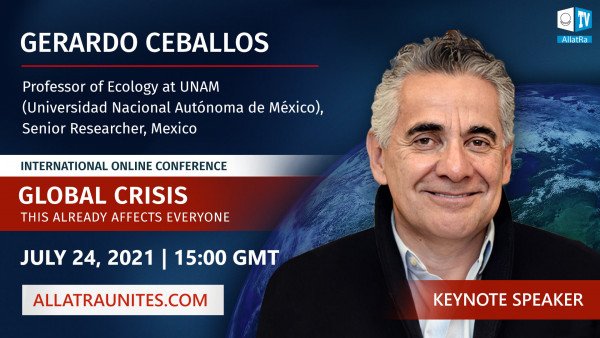Prof. Gerardo Ceballos
Biologist, ecologist and conservationist, PhD in ecology and evolutionary ecology, Professor of Biology, Senior Researcher at the Institute of Ecology at National Autonomous University of Mexico
Speaker Bio
Gerardo Ceballos is an ecologist and conservationist, well-known for his theoretical and empirical work on animal ecology and conservation. He is recognized for his influential work on global patterns of distribution of diversity, endemism, and extinction risk invertebrates. He is well known for his contribution to understanding the magnitude and impacts of the sixth mass extinction.
Gerardo Ceballos has been the president of the Mexican Mammal Society and is a member of both the National Academy of Sciences and the National Academy of Arts and Sciences.
Gerardo Ceballos’ laboratory is interested in animal population and community ecology, extinction patterns and processes, and linking conservation and development. His lab has carried out the longest population and community ecology study of small mammals in the tropics of the World.

Speech
I am Professor Gerardo Ceballos. I work at the National University of Mexico, and I am an ecologist that is specialized, basically in studying animals in the wild.
A few years ago in 2015, my colleagues and I, my colleagues from Berkeley and the University of Stanford and the University of Mexico, we put together this paper where we... What you can see here in red are the amount of this particular characteristic of the planet, you know, that is left. And we can see that in many cases we have lost more than 60, 50, 60, 70 percent of this particular ecosystem or a species.
We analyzed if species that were losing in the last 500 years, but mostly in the last century, are basically the same number that you would expect in the normal extinction rates or in higher extinction rates. And what we found and this is a very, rather dramatic... I want you to see here, this is a cumulative number of extinct species. This is the centuries, the intervals.
So if we were losing species at a normal rate, all the lines should be below the dotted line. But what we can see here is that in the last 500 years, but especially in the last century, we have started to lose species much, much faster than in the previous million years. And we can see here on this side that the number of species loss is directly related to the human population. Here is human population and this are species, and this line is almost perfect, you know.
And this has let us conclude that we have entered the sixth of mass extinction. There were five previous mass extinctions, all of them caused by natural catastrophes and this one is caused by us.
That's the bad news. The good news is that if it's caused by us, it can be prevented by our activities, by our actions.
But before you lose a species, you lose the populations. And what we have found is we're losing billions of populations every year.
So this is an example of what we caused. Well, here you can see we destroy the habitat to have more pasture or more crops. And you can see here that in dark areas, where most of the land is something like agriculture and cattle. And you will see, well, there are still many places on Earth that you can cultivate.
That's not true because, for instance, all this area is too cold, you know, all this area is too dry. And these are the tropical forests that are also not good for harvesting or for producing food. So, we basically are at the limit of what we can crop or use for cattle ranching on the planet.
So what does all this matter? Well, it is very important to understand that we are losing all these plants or animals. And there are so many reasons that are ethical, moral, philosophical, religious, all kinds of reasons to save plants and animals in the wild. But the most important one, it is, perhaps, that those plants or those animals are fundamental to maintain life on Earth. Life on Earth in general and human life in particular.
And this is because of all the wild plants and animals working together in this complex thing that we call ecosystems. And those ecosystems, by functioning properly, provide what we call environmental goods and services that are basically all these benefits that we get for free, for a well… the proper function of ecosystems. And we're talking... our clean water, all the clean water for humans, for all the plants and animals come from those ecosystems.
As people have said before, this is like a spaceship, the Earth is the only one, and we are destroying it.
I think I still have a lot of hope that we will be able to fight hard and to save many of these species, and at the same time, save humanity, save us from a collapse of civilization.